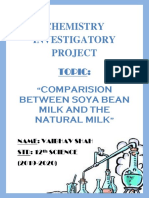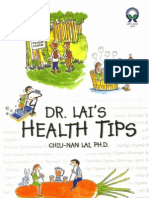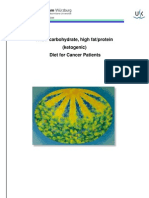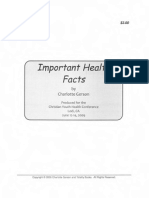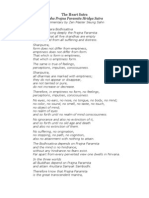Dean Ornish Mostly Plants
Dean Ornish Mostly Plants
Uploaded by
ipman0Copyright:
Available Formats
Dean Ornish Mostly Plants
Dean Ornish Mostly Plants
Uploaded by
ipman0Copyright
Available Formats
Share this document
Did you find this document useful?
Is this content inappropriate?
Copyright:
Available Formats
Dean Ornish Mostly Plants
Dean Ornish Mostly Plants
Uploaded by
ipman0Copyright:
Available Formats
Mostly Plants
Dean Ornish, MDa,b,*
Eat food. Mostly plants. Not too much. Michael Pollan,1 The Omnivores Dilemma
There is a growing convergence of scientic evidence that an optimal diet is mostly plant based, consisting predominantly of fruits, vegetables, whole grains, legumes, and soy products. A healthful diet is also low in rened carbohydrates, saturated fat, and trans fats and high in complex carbohydrates with adequate omega-3 fatty acids.2 In this issue, Kottler et al3 review studies indicating that a plant-based diet combined with nuts, soy, and/or ber reduces low-density lipoprotein (LDL) cholesterol by an average of 25% to 30%. This is comparable to what can be achieved with statin drugs but without the costs and potential side effects. Last year, almost $20 billion was spent on statin drugs in the United States. At a time when health care reform is at center stage, the potential cost savings of reducing the need for statin drugs by changing diet and lifestyle is of great interest. When most patients are diagnosed with hypercholesterolemia, they are usually advised to follow the dietary guidelines of the American Heart Association or the National Cholesterol Education Program. However, these moderate changes in diet usually result in only modest reductions in LDL cholesterol levels,4 at which point lipid-lowering drugs are usually prescribed. Most patients are not given the option of making more intensive changes in diet and lifestyle such as a plant-based diet, because of the belief that they will not follow them.5 This belief often becomes self-fullling. Mr. Jones, your LDL cholesterol level is elevated. I know you wouldnt follow a plant-based diet or even a modied plant-based diet, and why would you want to when I can give you a statin drug and that will do it? So the patient takes the drug, does not change his diet, and the doctor says, See, I knew he couldnt change his diet. The idea that taking a pill is easy and that most patients will adhere whereas changing diet and lifestyle is difcult if not impossible is not supported by most studies. In fact, research shows that up to 60% of patients prescribed lipidlowering drugs are not taking them only 6 months after initiating treatment.6 Why? Because patients are asked to take a pill that does not make them feel better in the hope of preventing something frightening, such as a myocardial infarction or stroke, which most people do not want to think about, so they usually do not. However, when people make comprehensive lifestyle changes, including a plant-based diet (or a modied planta Preventive Medicine Research Institute, Sausalito, California; and University of California, San Francisco, San Francisco, California. Manuscript received April 20, 2009; revised manuscript received and accepted May 13, 2009. *Corresponding author: Tel: 415-332-2525; fax: 415-332-5730 E-mail address: dean.ornish@pmri.org (D. Ornish). b
based diet), they often feel so much better, so quickly, that it reframes the reason for making these changes from fear of dying, which usually is not sustainable, to joy of living, which often is. Evidence suggests that a plant-based diet is benecial for preventing and treating a variety of chronic diseases. In addition to the effects of a plant-based diet on hypercholesterolemia, these include coronary artery disease, diabetes, hypertension, obesity, prostate cancer, breast cancer, and other conditions. In other words, it is not 1 diet for heart disease, another for diabetes, and another for hypercholesterolemia. A reason that these conditions are often associated is that they often share common diet and lifestyle origins. The National Institutes of Health and AARP study of 500,000 subjects reported that the consumption of red meat was signicantly associated with increases in total mortality, cardiovascular mortality, and cancer mortality.7 Measures of cardiovascular disease such as ow-mediated vasodilation as well as LDL cholesterol and inammation worsened on a typical Atkins diet but improved signicantly on a low-fat, whole-foods, plant-based diet.8 What we include in our diet is as important as what we exclude. Plant-based foods contain 100,000 disease-preventing nutrients, such as phytochemicals, bioavonoids, carotenoids, retinols, isoavones, genistein, lycopene, polyphenols, sulforaphanes, and so on.9 They are also low in disease-promoting constituents such as saturated fats, trans fatty acids, dietary cholesterol, and sugar. For example, blueberries contain phytochemicals called anthocyanins that may improve memory. Tomatoes are rich in lycopene, an antioxidant that may help reduce the risk for coronary artery disease, breast cancer, lung cancer, and prostate cancer. Ginger contains a compound called gingerol that may lower blood pressure and increase circulation. Pomegranates are rich in phytochemicals that may help prevent prostate cancer by reducing deoxyribonucleic acid damage and may increase myocardial perfusion in those with ischemic heart disease.10 Kale contains luting, an antioxidant that protects against macular degeneration. Studies are showing that although isolated vitamins may not be benecial, plant-based foods that contain these vitamins often are protective. For example, -carotene supplements were found to increase the risk for lung cancer in smokers, whereas foods such as carrots that are rich in -carotene were found to lower the risk.11 In our studies, my colleagues and I at the nonprot Preventive Medicine Research Institute, in collaboration with other institutions, found that a plant-based diet (along with moderate exercise, such as walking 30 minutes/day, stress management techniques such as meditation and yoga, and increased social support) was able to stop or reverse the progression of even severe coronary artery disease as measured by exercise thallium scintigraphy,12 radionuclide ventriculography,13 cardiac positron emission tomography,14
www.AJConline.org
0002-9149/09/$ see front matter 2009 Published by Elsevier Inc. doi:10.1016/j.amjcard.2009.05.031
958
The American Journal of Cardiology (www.AJConline.org) 2. Ornish D. The Spectrum. New York: Ballantine, 2008:386. 3. Kottler BM, Ferdowsian HR, Barnard ND. Effects of plant-based diets on plasma lipids. Am J Cardiol 2009;104:947956. 4. Hunninghake DB, Stein EA, Dujovne CA, Harris WS, Feldman EB, Miller VT, Tobert JA, Laskarzewski PM, Quiter E, Held J, Taylor AM, Hopper S, Leonard SB, Brewer BK. The efcacy of intensive dietary therapy alone or combined with lovastatin in outpatients with hypercholesterolemia. N Engl J Med 1993;328:12131219. 5. Ornish D. Statins and the soul of medicine. Am J Cardiol 2002;89: 1286 1290. 6. Liberopoulos EN, Florentin M, Mikhailidis DP, Elisaf MS. Compliance with lipid-lowering therapy and its impact on cardiovascular morbidity and mortality. Expert Opin Drug Saf 2008;7:717725. 7. Sinha R, Cross AJ, Graubard BI, Leitzmann MF, Schatzkin A. Meat intake and mortality: a prospective study of over half a million people. Arch Intern Med 2009;169:562571. 8. Miller M, Beach V, Sorkin JD, Mangano C, Dobmeier C, Novacic D, Rhyne J, Vogel RA. Comparative effects of three popular diets on lipids, endothelial function, and C-reactive protein during weight maintenance. J Am Diet Assoc 2009;109:713717. 9. Dewell A, Weidner G, Sumner MD, Chi CS, Ornish D. A very low-fat vegan diet increases intake of protective dietary factors and decreases intake of pathogenic dietary factors. J Am Diet Assoc 2008;108:347 356. 10. Sumner MD, Elliott-Eller M, Weidner G, Daubenmier JJ, Chew MH, Marlin R, Raisin CJ, Ornish D. Effects of pomegranate juice consumption on myocardial perfusion in patients with coronary heart disease. Am J Cardiol 2005;96:810 814. 11. Omenn GS, Goodman GE, Thornquist MD, Balmes J, Cullen MR, Glass A, Keogh JP, Meyskens FL, Valanis B, Williams JH, Barnhart S, Hammar S. Effects of a combination of beta carotene and vitamin A on lung cancer and cardiovascular disease. N Engl J Med 1996;334: 1150 1155. 12. Ornish DM, Gotto AM, Miller RR, Rochelle D, McAllister GK. Effects of a vegetarian diet and selected yoga techniques in the treatment of coronary heart disease. Clin Res 1979;27:720A. 13. Ornish DM, Scherwitz LW, Doody RS, Kesten D, McLanahan SM, Brown SE, DePuey E, Sonnemaker R, Haynes C, Lester J, McAllister GK, Hall RJ, Burdine JA, Gotto AM Jr. Effects of stress management training and dietary changes in treating ischemic heart disease. JAMA 1983;249:54 59. 14. Gould KL, Ornish D, Scherwitz L, Brown S, Edens RP, Hess MJ, Mullani N, Bolomey L, Dobbs F, Armstrong WT, Merritt T, Ports T, Sparler S, Billings J. Changes in myocardial perfusion abnormalities by positron emission tomography after long-term, intense risk factor modication. JAMA 1995;274:894 901. 15. Ornish DM, Brown SE, Scherwitz LW, Billings JH, Armstrong WT, Ports TA, McLanahan SM, Kirkeeide RL, Brand RJ, Gould KL. Can lifestyle changes reverse coronary heart disease? The Lifestyle Heart Trial. Lancet 1990;336:129 133. 16. Ornish D, Scherwitz LW, Billings JH, Brown SE, Gould KL, Merritt TA, Sparler S, Armstrong WT, Ports TA, Kirkeeide RL, Hogeboom C, Brand RJ. Intensive lifestyle changes for reversal of coronary heart disease. JAMA 1998;280:20012007. 17. Ornish D, Weidner G, Fair WR, Marlin R, Pettengill EB, Raisin CJ, Dunn-Emke S, Crutcheld L, Jacobs FN, Barnard RJ, Aronson WJ, McCormac P, McKnight DJ, Fein JD, Dnistrian AM, Weinstein J, Ngo TH, Mendell NR, Carroll PR. Intensive lifestyle changes may affect the progression of prostate cancer. J Urol 2005;174:10651070. 18. Ornish D, Magbanua MJ, Weidner G, Weinberg V, Kemp C, Green C, Mattie MD, Marlin R, Simko J, Shinohara K, Haqq CM, Carroll PR. Changes in prostate gene expression in men undergoing an intensive nutrition and lifestyle intervention. Proc Natl Acad Sci U S A 2008; 105:8369 8374. 19. Ornish D, Lin J, Daubenmier J, Weidner G, Epel E, Kemp C, Magbanua MJ, Marlin R, Yglecias L, Carroll PR, Blackburn EH. Increased telomerase activity and comprehensive lifestyle changes: a pilot study. Lancet Oncol 2008;9:1048 1057. 20. Food and Agriculture Organization of the United Nations. Livestocks Long Shadow: Environmental Issues and Options. Available at: http:// www.fao.org/docrep/010/a0701e/a0701e00.HTM. Accessed June 9, 2009.
and quantitative coronary arteriography.15 There was even more improvement after 5 years than after 1 year, and there was a direct correlation between the degree of change in diet and lifestyle and the degree of improvement in percentage diameter stenosis. Also, we found 2.5 times fewer cardiac events.16 We conducted a randomized controlled trial indicating that the progression of early-stage prostate cancer was slowed, stopped, or reversed in patients who followed a plant-based diet and lifestyle intervention.17 We are gaining a greater understanding of some of the genetic mechanisms by which these diet and lifestyle changes are benecial. For example, we found that this intervention caused benecial changes in gene expression in 500 genes in only 3 months, upregulating disease-preventing genes and downregulating oncogenes that promote breast cancer and prostate cancer and also downregulating genes that promote inammation and oxidative stress, which often contribute to the cause and progression of coronary artery disease.18 We also found that these lifestyle changes increased telomerase, the enzyme that lengthens telomeres, the ends of our chromosomes that affect longevity.19 Even drugs have not been shown to do this. Also, whats good for you is also good for our planet. Animal agribusiness generates more greenhouse gases than all transportation combined.20 The livestock sector generates more greenhouse gas emissions as measured in carbon dioxide equivalent than transportation (18% vs 13.5%). Also, it accounts for 9% of the carbon dioxide derived from human-related activities. It generates 65% of the humanrelated nitrous oxide, which has 296 times the global warming potential of carbon dioxide. It is also responsible for 37% of all the human-induced methane, which is 23 times more warming than carbon dioxide. Nitrous oxide and methane mostly come from manure, and 56 billion food animals produce a lot of manure each day. Also, livestock now use 30% of the earths entire land surface, mostly for permanent pasture but also including 33% of global arable land to produce feed for them. As forests are cleared to create new pastures, it is a major driver of deforestation: some 70% of forests in the Amazon have been turned over to grazing. Finally, eating lower on the food chain is a more efcient way to produce protein. It takes signicantly more resources to produce meat-based protein than plant-based protein. As the earths population continues to increase and resources decrease, choosing to eat more plant-based foods frees up more resources to help feed others. Knowing that the food choices we make each day not only help ourselves and our family but also our planet often brings a sense of meaning; for many people, this is a powerful motivator. Many people tend to think of breakthroughs in medicine as new drugs, lasers, or high-tech surgical procedures. They often have a hard time believing that the simple choices that we make in our lifestyleswhat we eat, how we respond to stress, whether or not we smoke cigarettes, how much exercise we get, and the quality of our relationships and social support can be as powerful as drugs and surgery, but they often are. Sometimes, even better.
1. Pollan M. The Omnivores Dilemma: A Natural History of Four Meals. New York, New York: Penguin, 1996.
You might also like
- Epi-Paleo RX The Prescription For Disease ReversalDocument149 pagesEpi-Paleo RX The Prescription For Disease ReversalNeilGoddard100% (22)
- MARKUS ROTHKRANZ - Arteries and CholesterolDocument46 pagesMARKUS ROTHKRANZ - Arteries and CholesterolHenry Smitovsky100% (6)
- The Macrobiotic Approach To CancerDocument181 pagesThe Macrobiotic Approach To CancerFady Nassar100% (13)
- Chemistry Investigatory ProjectDocument14 pagesChemistry Investigatory Projectvaibhav shah71% (14)
- Project Report On Soyabean Solvent Extraction Unit With Vegetable Oil RefineryDocument8 pagesProject Report On Soyabean Solvent Extraction Unit With Vegetable Oil RefineryEIRI Board of Consultants and PublishersNo ratings yet
- Diabetes Code JAson FungDocument10 pagesDiabetes Code JAson Fungsimas100% (3)
- Joel Fuhrman - Food Scoring Guide PDFDocument0 pagesJoel Fuhrman - Food Scoring Guide PDFLiceul MihaiViteazu100% (6)
- MindfulnessDocument192 pagesMindfulnessNatalia Rojas Sattui96% (28)
- Disease Reversal and Prevention Digest, Issue #1, 2019 SpringDocument90 pagesDisease Reversal and Prevention Digest, Issue #1, 2019 Springcharlesincharge100% (1)
- Take Control of Your Health and Escape The Sickness IndustryDocument348 pagesTake Control of Your Health and Escape The Sickness IndustryCarlos Chafla100% (1)
- Acid Alkaline Acid AlkalineDocument5 pagesAcid Alkaline Acid AlkalineNickHansenNo ratings yet
- Natural Healing Through MacrobioticsDocument199 pagesNatural Healing Through Macrobioticseasyplc100% (13)
- Curing The Incurable: Advances in Nutritional Science To Prevent and Reverse DiseaseDocument28 pagesCuring The Incurable: Advances in Nutritional Science To Prevent and Reverse DiseaseLalindra Kumara89% (9)
- Dietary Cure For Acne by Dr. Loren Cordain The Paleo Diet The Paleo Diet™Document1 pageDietary Cure For Acne by Dr. Loren Cordain The Paleo Diet The Paleo Diet™Edu WilliamNo ratings yet
- The Holford DietDocument28 pagesThe Holford Dietmahabahar100% (1)
- Master Cleanse Insider: Courtesy of Katie JonesDocument11 pagesMaster Cleanse Insider: Courtesy of Katie JonesKwatie100% (1)
- Michio Kushi, Edward Esko - The Macrobiotic Approach To Cancer 1991 PDFDocument184 pagesMichio Kushi, Edward Esko - The Macrobiotic Approach To Cancer 1991 PDFPablo Padilla Muñoz100% (3)
- The Self Health RevolutionDocument6 pagesThe Self Health RevolutionIlija RistevskiNo ratings yet
- A Guide To What and How To Eat Non Alcoholic Fatty Liver DiseaseDocument48 pagesA Guide To What and How To Eat Non Alcoholic Fatty Liver DiseaseAkash Bhavsar100% (1)
- What Should I Eat?: Solve Diabetes, Lose Weight, and Live HealthyFrom EverandWhat Should I Eat?: Solve Diabetes, Lose Weight, and Live HealthyNo ratings yet
- Dr. Lai's Health Tips - Lai Chiu-NanDocument162 pagesDr. Lai's Health Tips - Lai Chiu-Nanipman0100% (5)
- BCM-Blood Circulatory Massager - TIEN'S PresentationDocument52 pagesBCM-Blood Circulatory Massager - TIEN'S PresentationSudipta Bose75% (8)
- Statin Drugs-What Your Doctor Should Have Told YouDocument3 pagesStatin Drugs-What Your Doctor Should Have Told YouDr. Michael Ackerman100% (2)
- A New Look at Vegetarianism: Health & Spiritual SeriesFrom EverandA New Look at Vegetarianism: Health & Spiritual SeriesRating: 5 out of 5 stars5/5 (1)
- Animal Protein Vs Plant Protein.Document7 pagesAnimal Protein Vs Plant Protein.Emmanuel Charles100% (1)
- How Not To Die Anatomy PDFDocument1 pageHow Not To Die Anatomy PDFis03lcm100% (5)
- DR Ornish Program Insert PDFDocument2 pagesDR Ornish Program Insert PDFShilpa Oswal50% (2)
- WahlsPyramid PDFDocument1 pageWahlsPyramid PDFgaspar69019683No ratings yet
- A Special Interview With Dr. Natasha Campbell-Mcbride by Dr. MercolaDocument25 pagesA Special Interview With Dr. Natasha Campbell-Mcbride by Dr. Mercolaruth19774No ratings yet
- Vitamin C 24/7: Optimizing The Impact of A Universal TherapyDocument56 pagesVitamin C 24/7: Optimizing The Impact of A Universal TherapySilambarasu KaruppiahNo ratings yet
- Interview Aseem Malhotra SaturatedFats PDFDocument13 pagesInterview Aseem Malhotra SaturatedFats PDFdanNo ratings yet
- DR Jason Fung Fasting As A Therapeutic Option For Weight LossDocument23 pagesDR Jason Fung Fasting As A Therapeutic Option For Weight LossFelipe AlvesNo ratings yet
- Whole Foods Plant Based Diet5749Document32 pagesWhole Foods Plant Based Diet5749selva100% (3)
- Andrew Gym Power Fat Blasting ProgramDocument34 pagesAndrew Gym Power Fat Blasting ProgramAndrew EscagedaNo ratings yet
- Vitamin C CalamityDocument10 pagesVitamin C Calamityjregister10No ratings yet
- Last Resort Sugar DetoxDocument74 pagesLast Resort Sugar Detoxlucaste50No ratings yet
- Ignore The Awkward by Uffe RavnskovDocument91 pagesIgnore The Awkward by Uffe Ravnskov2361983100% (1)
- David PerlmutterDocument25 pagesDavid PerlmutteralicedwyerNo ratings yet
- I Love Nutritional Science by Dr. Joel Fuhrman (Full Transcript)Document10 pagesI Love Nutritional Science by Dr. Joel Fuhrman (Full Transcript)abbkr48No ratings yet
- PritikinDocument15 pagesPritikinpatobotero043No ratings yet
- Joel Fuhrman - Eat To LiveDocument7 pagesJoel Fuhrman - Eat To LiveSuranga Pieris0% (1)
- Blended - Greens - For - Health - and - Longevity Dr. Ritamarie LoscalzoDocument44 pagesBlended - Greens - For - Health - and - Longevity Dr. Ritamarie LoscalzoKsenija MedicNo ratings yet
- Curing Cancer With KetosisDocument29 pagesCuring Cancer With KetosisDavid Michael Wilson100% (1)
- Low Starch DietDocument26 pagesLow Starch DietDragana ZagorcicNo ratings yet
- Caldwell Esselstyn PDFDocument53 pagesCaldwell Esselstyn PDFMuhammad Azhar Saleem86% (7)
- Optimizing Your Health: An Approachable Guide to Reducing Your Risk of Chronic DiseaseFrom EverandOptimizing Your Health: An Approachable Guide to Reducing Your Risk of Chronic DiseaseNo ratings yet
- Rson Health FactsDocument10 pagesRson Health FactsJoy Shiawse100% (3)
- Walter Kempner, MD-Founder of The Rice DietDocument10 pagesWalter Kempner, MD-Founder of The Rice DietMax VeersNo ratings yet
- Bekker Complete Cancer Report 1.3 02Document208 pagesBekker Complete Cancer Report 1.3 02dragomir_emilia92100% (1)
- Green For Life - Victoria BoutenkoDocument223 pagesGreen For Life - Victoria BoutenkodudutraNo ratings yet
- The 7 Principles of Stress: Extend Life, Stay Fit, and Ward Off Fat--What You Didn't Know about How Stress Can Reboot Your Mind, Energy, and Sex LifeFrom EverandThe 7 Principles of Stress: Extend Life, Stay Fit, and Ward Off Fat--What You Didn't Know about How Stress Can Reboot Your Mind, Energy, and Sex LifeNo ratings yet
- The Bone Broth Diet PlusDocument21 pagesThe Bone Broth Diet Pluspeter abilez100% (1)
- Why I Quit The Macrobiotic Diet: Carl FerréDocument3 pagesWhy I Quit The Macrobiotic Diet: Carl FerréMus OubNo ratings yet
- The Diet Delusion by Gary TaubesDocument1 pageThe Diet Delusion by Gary Taubesdebnathsuman49No ratings yet
- The Benefits of Water TherapyDocument5 pagesThe Benefits of Water TherapyJohn Paul CordovaNo ratings yet
- Glycemic Index Food Chart PDFDocument15 pagesGlycemic Index Food Chart PDFZikriaKMuhammad67% (3)
- Essential Daily Super FoodsDocument1 pageEssential Daily Super FoodsHarperOne (an imprint of HarperCollins)20% (10)
- Three Good Bowel MovementsDocument2 pagesThree Good Bowel MovementsTunas HarapanNo ratings yet
- Dr. Greger's Daily Dozen: Food Serving SizeDocument1 pageDr. Greger's Daily Dozen: Food Serving SizeDianaNo ratings yet
- The Free McDougall ProgramDocument102 pagesThe Free McDougall ProgramLorrie100% (9)
- The McDougall PlanDocument354 pagesThe McDougall Plancozi100% (9)
- Osteoporosis Diet: A Beginner's Step-by-Step Guide To Preventing and Reversing Osteoporosis Through Nutrition With Recipes and a Meal PlanFrom EverandOsteoporosis Diet: A Beginner's Step-by-Step Guide To Preventing and Reversing Osteoporosis Through Nutrition With Recipes and a Meal PlanNo ratings yet
- Wheat Belly - Summarized for Busy People: Lose the Wheat, Lose the Weight, and Find Your Path Back to HealthFrom EverandWheat Belly - Summarized for Busy People: Lose the Wheat, Lose the Weight, and Find Your Path Back to HealthNo ratings yet
- The Complete Guide to High Cholesterol: Symptoms, Risks, Treatments & CuresFrom EverandThe Complete Guide to High Cholesterol: Symptoms, Risks, Treatments & CuresNo ratings yet
- Trusting in MindDocument4 pagesTrusting in Mindipman0No ratings yet
- Trust in Mind Hsin / Shin Ming SMLDocument13 pagesTrust in Mind Hsin / Shin Ming SMLipman050% (2)
- Zen Is Just Like This (English)Document48 pagesZen Is Just Like This (English)ipman0100% (4)
- 12 Foods With Super-Healing PowersDocument9 pages12 Foods With Super-Healing Powersipman0100% (1)
- Fruit N Veg Pesticide Ranking EWG 2011Document5 pagesFruit N Veg Pesticide Ranking EWG 2011ipman0No ratings yet
- Working With AngerDocument37 pagesWorking With AngerYau YenNo ratings yet
- Heart Sutra - Commentary by Zen Master Seung SahnDocument7 pagesHeart Sutra - Commentary by Zen Master Seung Sahnipman0No ratings yet
- Brooks Kubik DietDocument22 pagesBrooks Kubik DietStan Van Hoecke67% (3)
- Vitamode ReduSterolDocument1 pageVitamode ReduSterolcatherinegohNo ratings yet
- Understanding Olive Oil - Part 1: GeneralDocument2 pagesUnderstanding Olive Oil - Part 1: Generalvksk1951No ratings yet
- Popeyes Nutrition FactsDocument11 pagesPopeyes Nutrition FactsyogurtgreekNo ratings yet
- Lipids: Bettelheim / Brown / Campbell / Farrell / TorresDocument43 pagesLipids: Bettelheim / Brown / Campbell / Farrell / TorresKatriceNo ratings yet
- Ayurveda MagicDocument154 pagesAyurveda MagicGabriel Lucrezio100% (2)
- Low-Fat Vs Low-CarbDocument8 pagesLow-Fat Vs Low-CarbTrismegisteNo ratings yet
- Caralluma FibriattaDocument31 pagesCaralluma FibriattaFERNANDO JOSE NOVAESNo ratings yet
- Transport Across Cell Membranes QPDocument18 pagesTransport Across Cell Membranes QPjmelsycyrusNo ratings yet
- Public Health Module: Venue DateDocument81 pagesPublic Health Module: Venue DateluluNo ratings yet
- Milk and Health: Review ArticleDocument11 pagesMilk and Health: Review ArticleCatalina von MentlenNo ratings yet
- Anatomy and Physiology of The LiverDocument8 pagesAnatomy and Physiology of The LiverDianne MacaraigNo ratings yet
- Appenix19 - IDNT Terminology PDFDocument6 pagesAppenix19 - IDNT Terminology PDFAkiara KazuiNo ratings yet
- Quiz 4 Bme4aDocument15 pagesQuiz 4 Bme4aUsman YounasNo ratings yet
- Laboratorijske Pretrage WebDocument127 pagesLaboratorijske Pretrage WebLuka LeskoNo ratings yet
- Thyrocare VK 17:08:2022Document13 pagesThyrocare VK 17:08:2022S KNo ratings yet
- Department of Haematology: Investigation Name Result Bio. Ref. Range MethodDocument7 pagesDepartment of Haematology: Investigation Name Result Bio. Ref. Range MethodarupNo ratings yet
- Alao F Study Paper Lipids 5Document7 pagesAlao F Study Paper Lipids 5JohnCrizNo ratings yet
- The Physiological Value of Continence - Dr. Raymond W. BernardDocument16 pagesThe Physiological Value of Continence - Dr. Raymond W. Bernardkphillips_biz899650% (2)
- Lipids ReportDocument33 pagesLipids ReportCaryl Ann C. SernadillaNo ratings yet
- Media Medika IndonesianaDocument8 pagesMedia Medika IndonesianaMuhammad Hamzah AsadullahNo ratings yet
- Case Study 2 - FinishedDocument12 pagesCase Study 2 - Finishedapi-307945760No ratings yet
- BIO 101 Worksheet 10Document4 pagesBIO 101 Worksheet 10Xia AlliaNo ratings yet
- How Cholesterol WorksDocument7 pagesHow Cholesterol WorksVishal Kumar ShawNo ratings yet
- FATS AND OTHER LIPIDS Report Basic Nutri Group 5 BSND1ADocument19 pagesFATS AND OTHER LIPIDS Report Basic Nutri Group 5 BSND1AMA. NECOLE JEREMIAH GONZALESNo ratings yet



